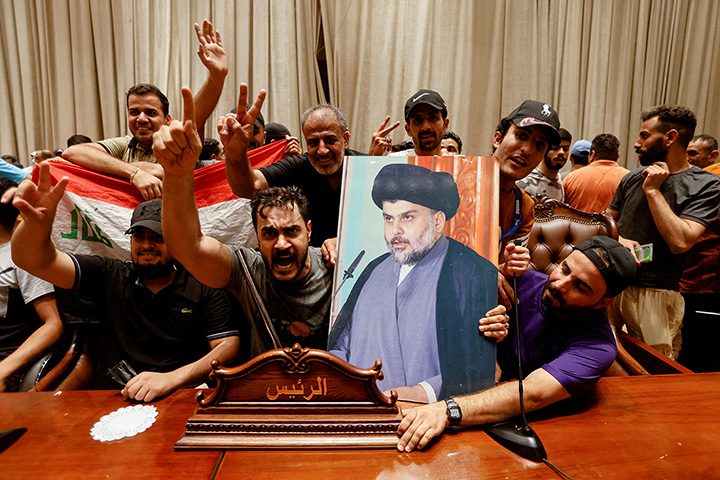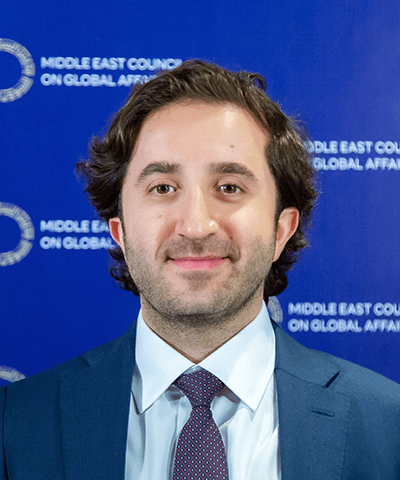Iraq’s Political System is nearing irreversible collapse after months of escalatory measures by rival Shi’ite factions have brought the country to the brink of civil war. The trajectory of conflict appears irreversible and would imperil not only the rebuilding of Iraq after years of upheaval but hold implications for stability in the broader region, as well.
In late July, Muqtada al-Sadr, the powerful cleric that heads Iraq’s most formidable socio-political movement, rallied hundreds of thousands of his followers to storm and occupy Iraq’s parliament, showcasing his unparalleled influence on the Iraqi street. This followed weeks of verbal attacks between Sadr and his rivals from the Coordination Framework, a bloc of Shi’ite political forces closely tied to Iran. The Shi’ite Coordination Framework includes former Prime Minister Nouri al-Maliki and the Popular Mobilization Force (PMF), an umbrella militia organization led and dominated by Iran-aligned factions. After Sadr emerged victorious in parliamentary elections held in October and threatened to exclude the PMF from the next government, the Coordination Framework launched a campaign to undermine Sadr’s post-election cross-sectarian alliance that included the Kurdistan Democratic Party (KDP) and the prominent Arab Sunni official Mohammed al-Halbousi.
The Coordination Framework’s violent tactics, which have included rocket and drone attacks on the Kurds, the co-option and weaponization of the judiciary, and a series of assassinations against Sadrist commanders, destabilized and divided the Sadr-led coalition and made Sadr’s allies vulnerable to further coercive and punitive measures. Such methods were ultimately successful in subverting a Sadr-led majority government and have played no small part in the current upheaval.
With his back inching toward a wall, Sadr has initiated his counter-offensive with the hope of either emerging from the current crisis as the supreme political force in Iraq, or at least shifting the pendulum back in his favor so that he can negotiate from a position of strength. Sadr appears determined to strengthen his negotiating hand and potentially resuscitate his weakened political alliance, either as part of a settlement between the rival factions or ahead of fresh elections, a scenario that is looming on the horizon. This strategy comes with great risks, however, including the possibility of igniting an intra-Shi’ite civil war that will devastate an Iraqi state still struggling to revive its economy and implement much-needed economic reforms, as well as a society still recovering from the war on Islamic State (ISIS).
Is conflict inevitable?
The prospects of a conflict are high. Sadr has bitter and long-standing conflicts with key members of the Coordination Framework, especially al-Maliki. The former prime minister is responsible for the 2008 military operation codenamed “Charge of the Knights” that ousted Sadrist fighters and supporters from Basra and forced the cleric to retreat into self-imposed exile in Iran. That operation resulted in the fragmentation of the Sadrist movement and the emergence of splinter organizations like Asaib Ahl al-Haq, which has vied for influence among the traditional Sadrist support base of destitute and impoverished Shi’ites in the Sadr City district of Baghdad. In other words, the conflict between Sadr and al-Maliki is deeply personal. Tensions reached a boiling point, and arguably triggered Sadr’s decision to mobilize his supporters to sack parliament, after al-Maliki had raised the specter of war in leaked audio recordings, in which he ostensibly instructed members of his tribe to prepare for armed conflict with Sadr.
Since the assault on parliament, the likelihood of a violent showdown has shown little sign of abating. On August 8, al-Maliki rejected Sadr’s demand to have parliament formally dissolved, stating in a televised message that the legislature could not be dissolved, and no elections held until the current body of representatives returned to session. Sadr’s demand was then rejected by the Supreme Court, which has been weaponized by Iran and its allies, under the pretext that it could not interfere in political matters or matters of the executive. Sadr then upped the ante again by appealing directly to his supporters with a provocative and ambiguous “final call,” and urging country-wide protests. This week, Sadr’s supporters mobilized outside the Supreme Court and shut it down, which was vehemently condemned by his rivals.
Despite war looking increasingly inevitable, there are two key developments that could be crucial to forestalling it. First, the KDP, with the support of the Patriotic Union of Kurdistan (PUK), has invited Sadr and the Coordination Framework to Erbil for peace talks. This forms part of a long-standing and historical pattern of Kurdish interventions in mediating conflicts among the Shi’ite political class, which has been essential to either preventing or containing outbreaks of violence. Secondly, under the guidance of Hadi al-Ameri, the head of the Iran-aligned Badr Organization militia, the Coordination Framework is currently assessing how much appetite there is for dissolving parliament and holding new elections. Essentially, the aim of both interventions is to avoid the uncertainty and volatility of elections and galvanize the wider political class around peace talks and a settlement. This could restore the post-2003 political order, in which elite bargaining re-establishes a delicate balance of power between the powerful rival factions.
However, while early elections might be the best hope of forestalling a civil war, Sadr may no longer accept this as a concession. The surprise move by Sadr’s supporters has shifted momentum back in their camp’s favor. Sadr will likely want to capitalize on the opportunity of having his opponents on their back foot rather than gifting them a new lease of life by sending the country back to the polls and allowing the Coordination Framework time to electorally and politically mobilize.
At this point, neither al-Maliki nor Sadr appears prepared to lose face. Given the lengths Sadr has already gone, he may have no choice but to continue along the current path of escalation. Al-Maliki, for his part, cannot afford to look weak by being outmaneuvered by Sadr or he risks losing the support of Iran and the PMF, the two backers most crucial to his political survival. Taken together, the situation may have already reached the point of no return.
An anxious region looks on
Regional actors and the wider international community appear to view the Sadrist movement’s storming of the Iraqi parliament with a mix of intrigue and unease. The Gulf states and Turkey have, in large part, welcomed the move by Sadr to try and force the PMF and other Iran-aligned groups to make concessions. In particular, Sadr’s move enjoys tacit support from the United Arab Emirates and the Turkish-aligned KDP, which also has good relations with Saudi Arabia and Qatar. Khamis al-Khanjar, an influential Arab Sunni official who leads the Azm Alliance and also has strong ties to Qatar and Turkey, backed Sadr’s move and openly called for a change in the political system unless the Coordination Framework agrees in writing to the Sadr-led alliance’s demands. Western states have generally refrained from explicitly condemning the attack and instead called for peaceful protests. From the perspective of the region, the implosion currently unfolding has been a long time in the making and may have been unavoidable.
While the region generally has no appetite for an intra-Shi’ite civil war, the Gulf states do see Sadr and his strategy as the only realistic avenue for imposing a check on the influence of Iran-aligned groups and their attempts to restore their control and authority over the Iraqi state. That said, sources have indicated that Turkish President Recep Erdogan is particularly keen on seeing the Iraqi crisis continue because it deflects focus away from his controversial campaign against the Kurdistan Workers Party (PKK) in northern Iraq, while the Gulf Cooperation Council has long championed Sadr as the great Arab hope who could shift the balance of power away from Iran and its allies in Iraq. Regional apprehensions would have been greater were it not for the fact that Sadr built a cross-sectarian alliance with the likes of KDP, Halbousi, and Khanjar. This has helped alleviate regional discomfort with the idea of a Sadr takeover, not least since regional actors have long concluded that Baghdad is under de-facto Iranian control.
The picture will become complicated for the region and the international community if the PMF, with Iranian backing, moves to provoke a war in the Arab Sunni heartland, since this would raise the prospect of a violent sectarian conflict, enable ISIS to reemerge, and complicate matters for Sadr. Provoking war would almost certainly be an option if the Coordination Framework were to run out of alternatives, but remains remote. There are also other possible plays that could prevent a major conflagration, including an intervention by Grand Ayatollah Ali al-Sistani, the leading clergyman of the Shi’ite Islamic world. However, given the pace of escalation in Iraq, Sistani may have already come to the conclusion that the crisis has surpassed the ability of the religious establishment to stop it, and that Najaf’s only role would be to manage and contain conflict rather than prevent it. Iraq, in other words, has no good solutions. At worst, it faces the prospect of yet another bloody civil war that could drive the country into a humanitarian crisis with region-wide implications. At best, Iraqis can hope to contain the looming conflict and avoid a total collapse.

